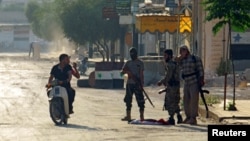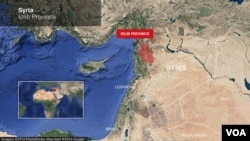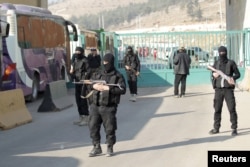Rebels in northern Syria have been fighting among themselves after one of the largest Syrian rebel groups was accused of having ties to the Islamic State.
The battles, that have been raging for days in Idlib province, threaten to weaken the rebels hold on the region as Syrian and Russian air strikes have increased to uproot them.
Rebels recently largely stopped fighting government forces and have lost some 30 percent of territory to government-backed forces, the Britain-based Syrian Observatory for Human Rights reported.
“Syrian government troops are the primarily winner of this fighting,” said Rami Abdulraham, the group's head. “As the fighting among rebels is ongoing, regime forces have made large advances in Idlib and stopped a rebel offensive in the nearby province of Hama.”
As Syrian civil war, which began in 2012, has grown more complex, nearly a dozen rebel forces have formed as the movement against Syrian President Bashar al-Assad splintered.
Ahrar al-Sham, a local extremist force and Jund al-Aqsa, another Islamist group, had been allies before battles erupted in Idlib last month. Local reports said nearly 100 fighters have been killed on both sides in the recent fighting.
Idlib has a strategic and symbolic significance for Islamist rebel forces. It borders Turkey and has been used as a supply point for anti-government forces elsewhere in the country. Idlib is also the only province where rebel fighters control much of the territory.
The most powerful rebel group in Idlib is the Fateh al-Sham Front, until recently an al-Qaida affiliate in Syria. It has been deemed a terrorist organization by the United States. Through a complicated chain of alliances with other rebel fighters, the group has been in control of Idlib since March 2015 after rebels pushed out government troops from their last positions in the western part of the province.
The U.S.-led coalition has occasionally targeted Fateh al-Sham positions in Idlib. The Pentagon last week confirmed the death of a prominent al-Qaida leader in an airstrike in Idlib.
Hoping to stem the rebel infighting, Fateh al-Sham brokered an agreement between Jund al-Aqsa and Ahrar al-Sham that it hopes will lead to a lasting cease-fire and the release of hostages by both sides.
But given IS’s alleged influence in the rebel infighting, analysts say the agreement is unlikely to hold. While IS has no fighting presence in Idlib, it is attempting to build networks of local affiliates. Local activists say IS has long been recruiting in the province.
"(IS) has sleeper cells everywhere," a rights activist in Kafranbel, a town in Idlib province. He spoke to VOA on condition of anonymity for fear of retribution. The activist said there have been attempts by IS underground recruiters to mobilize local residents in his town to pledge allegiance to IS.
One of the rebel groups involved in the infighting in Idlib, Jund al-Aqsa, reportedly has ties with IS and was responsible for the assassination of several rebel commanders in Idlib, according to locals and analysts.
“Jund al-Aqsa has the same Salafi ideology as IS,” said Sadradeen Kinno, a Syrian reporter, who closely follows militant groups in the country.
Jund al-Aqsa recently tried to distance itself from IS by pledging loyalty to the ruling Fateh al-Sham. The move “has in a sense legitimized the group despite its towing a line more similar to [the Islamic State]” said Faysal Itani, a Syria expert at the Washington-based Atlantic Council.
If rebels can overcome their differences, they “can be freed to concentrate on operations against the (Syrian) regime,” Itani said.






